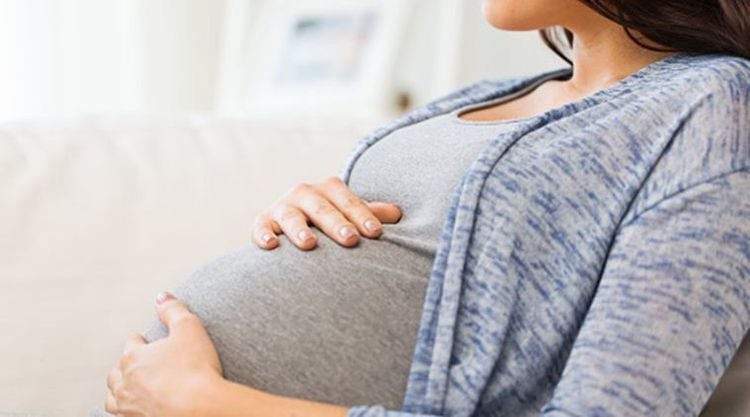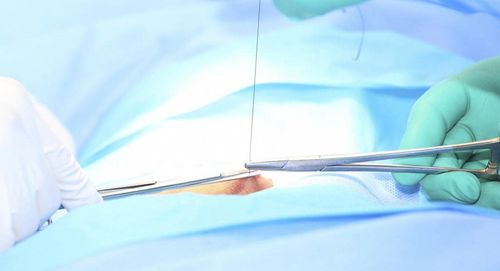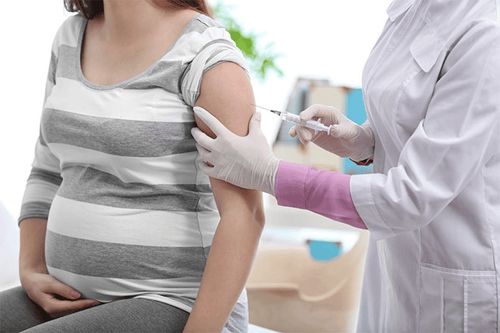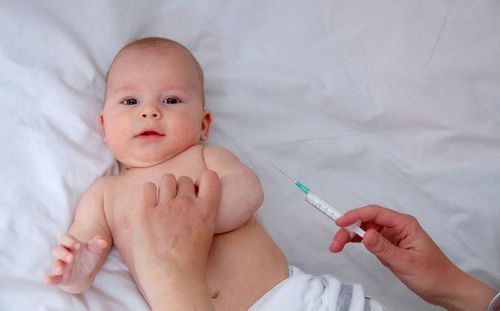This is an automatically translated article.
The article is professionally consulted by Specialist Doctor II Huynh Thi Hien - Obstetrician and Gynecologist - Department of Obstetrics and Gynecology - Vinmec Nha Trang International General Hospital
1. What is congenital rubella?
Rubella is a very rare disease that causes complications. Symptoms of rubella in children often appear quickly, do not cause discomfort to the child, only make family members worry. Particularly, adults and children over 7 years old often have many uncomfortable accompanying symptoms such as fatigue and joint pain, but they will also disappear after a few days without leaving any complications. However, the real burden of rubella is present in pregnant women.Women who have rubella during pregnancy, their babies will have a high risk of congenital rubella syndrome (CRS - babies infected with rubella before birth), this is a syndrome that causes the most severe and specific consequences of rubella. Rubella makes the medical profession pay special attention and ask for proactive prevention.
The first 3 months is the most dangerous time when rubella infection in pregnant women, because rubella virus from the mother's blood crosses the placenta into the fetus during the onset and full-blown stages of the disease. This virus has the ability to destroy or slow down the development of the embryo and this is the cause of birth defects for the fetus.
Pregnant mothers in the first trimester of pregnancy with congenital rubella infection can infect the fetus (very high rate, up to 80%). Congenital about 25%. There are no studies to confirm that if a woman becomes pregnant soon after receiving rubella vaccination, the baby will be born with congenital rubella infection due to the vaccine.
2. Severe consequences of congenital rubella

Rubella disease in pregnant women will cause babies to be infected with rubella before birth and have a risk of one or more birth defects and diseases such as:
Ears: Babies born will have a high risk of congenital deafness, this is The most common consequence and characteristic of congenital rubella Heart: the child has stenosis of the heart valve, the ductus arteriosus, the septal defect between the heart chambers or the pulmonary artery stenosis Eyes: The baby will be born with eye defects. such as cataracts, glaucoma, retinal diseases. Neurological: Children with mental retardation, microcephaly, cerebral palsy, meningitis, malformations in the brain, muscles, joints, physical strength, .. Other abnormalities such as liver, spleen, malformations of long bones,... Babies infected with rubella in utero may still shed virus in pharynx, feces, and urine many weeks after birth. life, maybe even longer.
3. Treatment and proactive prevention of Rubella
Currently there is no specific treatment for rubella and congenital rubella syndrome. When having Rubella in general, it is necessary to:
Treatment of symptoms such as pain relief, hypothermia Keep warm, avoid cold wind during the rash, prevent respiratory tract infections Eat enough nutrients to improve immunity resistance. Increase the intake of fruits such as oranges, lemons and vitamins For children with congenital Rubella syndrome need to be treated for complications caused by the disease Therefore, the best way to avoid unwanted complications due to rubella disease Each person, each pregnant woman needs to actively prevent rubella in general by:
It is best to vaccinate. For children, one dose is given at 15 months of age, the second dose is 6 to 10 months after the first dose, or the child is 4 to 6 years old. Adults who have never had rubella should also be vaccinated, especially women of childbearing age. For women, before trying to become pregnant, it is best to get vaccinated against Rubella. Time of vaccination before conception is at least 1 month, preferably 3-4 months before. Immunization before pregnancy is an effective measure to prevent congenital rubella syndrome in the baby. But when you are pregnant, absolutely do not get the rubella vaccine. Because rubella vaccine is a live attenuated vaccine, often produced in the form of a "triple" together with the measles and mumps vaccines, which is dangerous to the fetus. If you have not been vaccinated against rubella and are pregnant, the best measure is to prevent yourself from getting infected by limiting going to crowded places, especially during an epidemic, always wearing a mask when going out. Clean your mouth and respiratory tract regularly with regular mouthwash solutions. For pregnant women, especially in the first 3 months of pregnancy, it is necessary to closely monitor, if there are symptoms of rubella, they should go to the doctor for examination and advice at an obstetrician, an infectious disease specialist. . If women have rubella during pregnancy in the first 2-3 months, they are often advised to terminate the pregnancy to avoid the high risk of having a baby with birth defects; For the second and third trimester fetuses, if unfortunately infected, the doctor will advise that the pregnancy can be maintained but must be monitored closely after birth.

Vinmec International General Hospital is a reliable choice to ensure the quality of pre-pregnancy check-ups and vaccinations. Vinmec provides a full range of immunization vaccines according to updated protocols with vaccines and vaccination schedules. All biological products and vaccines at Vinmec are of clear origin and of high quality; preserved on the cold chain according to strict standards of the Ministry of Health and the World Health Organization. Customers are carefully examined and screened before vaccination, and their health is monitored after injection to ensure the highest safety and effectiveness of vaccination.
Please dial HOTLINE for more information or register for an appointment HERE. Download MyVinmec app to make appointments faster and to manage your bookings easily.














